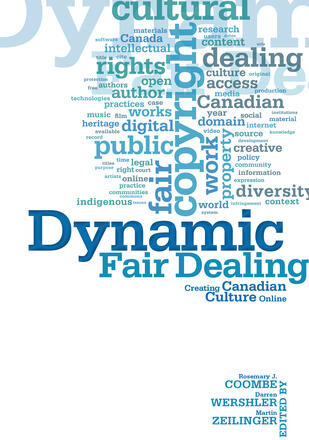INTRODUCING Dynamic Fair Dealing: Creating Canadian Digital Culture
Rosemary J. Coombe (York University, Canada Research Chair in Law, Communication and Culture), Darren Wershler (Concordia University Research Chair in Media & Contemporary Literature) and Martin Zeilinger (Banting Postdoctoral Fellow in Law and Culture, York University).
A. THE CANADIAN COPYRIGHT CONTEXT
I. Provocations: Fair Dealing as Right, Speech, Duty, and Practice
-
Copyright and Freedom of Expression: Fair Dealing Between Work and Play
Bita Amani (Queens University, Law School).
-
From the Right to Copy to Practices of Copying
Marcus Boon (York University, English).
II. Recognizing the Canadian Public Domain
-
The Canadian Public Domain: What, Where, and to What End?
Carys Craig (York University, Osgoode Law School).
-
Dynamic Fair Dealing with Orphan Works: Lessons from “Real” Propert
Ren Bucholz (Lenczner Slaght Royce Smith Griffin LLP )
-
Publicly Funded, Then Locked Away: The Work of the Canadian Broadcasting Corporation
Kyle Asquith (Western University, Information & Media Studies).
III. Infrastructures for Fair Dealing
-
Resisting Enclosure: Licenses, Authorship, and the Commons
John Maxwell (Simon Fraser University, Publishing).
-
Weaving an Open Web: Innovation and Ethics in the Virtual Commons
Eliot Che (Web Designer, Cultural Shifts).
-
“This Content is Not Available in Your Region”: Geo-Blocking Culture in Canada
Pete Urquhart (Wilfrid Laurier University, Communications) and Ira Wagman (Carleton University, Journalism & Communication).
-
Net Neutrality and the Threat to Open Cultural Expression
Steve Anderson (OpenMedia.ca).
IV. Experiments in Pedagogy and Diversity
-
Copyright and Access to Media for People with Perceptual Disabilities
J. P. Udo (Ryerson University, Centre for Learning Technologies) and Deborah Fels (Ryerson University, Centre for Learning Technologies).
-
If You’re Asking, It’s not Fair Dealing: Animating Canadian Copyright Issues in a ‘Read-Write’ Classroom
Matt Soar (Concordia University, Communications).
-
Hacking Education: How Openness and Sharing Can Transform Learning
Alec V. Couros (IT Coordinator, University of Regina, Faculty of Education).
B. MEDIATIONS
I. Digital Publishing
-
Open Access Publishing and Academic Research
Rowland Lorimer (Simon Fraser University, Canadian Centre for Studies in Publishing).
-
Open Access Mandates and the ‘Fair Dealing’ Button
Arthur Sale (University of Tasmania, Computer Science), Marc Couture (Université du Québec à Montréal, Télé-université), Eloy Rodrigues (Universidade do Minho, Portugal, Documentation Services), Leslie Carr (University of Southampton, School of Electronics and Computer Science) and Stevan Harnad (Université du Quebec à Montreal, Canada Research Chair in Cognitive Science).
II. Principles and Practices of Heritage Management
-
The Evolution of Cultural Heritage Ethics via Human Rights Norms
Rosemary J. Coombe (Canada Research Chair in Law, Communication and Culture, York University) Nicole Aylwin (York University, Communication and Culture).
-
Indigenous Cultural Heritage in the Age of Technological Reproducibility: Towards a Postcolonial Ethic of the Public Domain
George Nicholas (Simon Fraser University, Anthropology).
-
Cultural Diversity: A Central Dimension of Canadian Cultural Heritage?
Nicole Aylwin (York University, Communication and Culture).
III. The Work of Poetics
-
Parodists' Rights and Copyright in a Digital Canada
Graham Reynolds (Dalhousie University, Law).
-
Robin Hood of the Avant-Garde
Kenneth Goldsmith (University of Pennsylvania, Creative Writing).
-
Remixing bpNichol: 'Direct Dealing' and Recombinatory Art Practices
Justin Stephenson (Trace Pictures Animation and Design).
C. MAKING OUR DIGITAL HERITAGE A DYNAMIC ONE
I. Documenting Pasts and Assessing Virtual Futures
-
Copyright Dramas: Theatre Archives and Collections Online
David Meurer (York University, Communication and Culture).
-
Streaming a Digital Scream: Archiving Toronto’s Barbaric Yawp
Suzanne Zelazo (Ryerson University, English).
-
The NFB, Canada’s Experimental Documentary Tradition and Found Futures
Martin Zeilinger (York University, Communication and Culture) and ElHorwatt (YorkUniversity, Film and Media).
II. Recombinant Creativity
-
i. Chipmusic, Out of Tune: Crystal Castles and the Misappropriation of Licensed Sound
Martin Zeilinger (York University, Communication and Culture).
-
'My Real’ll Make Yours a Rental': Hip Hop and Canadian Copyright
Alexandra Boutros (Wilfrid Laurier University, Cultural Studies).
-
Friction over Fan Fiction
Grace Westcott (Westcott Law, Toronto).
-
Child-Generated Content: Children’s Authorship and Interpretive Practices in Digital Gaming Cultures
Sara M. Grimes (University of Toronto, Faculty of Information).
AFTERWORD: REFLECTIONS
Deal with it
Laura Murray (Queens University, English).
Pull up the stakes and fill in the ditches: the materiality of intellectual property
Darin Barney (McGill University, Art History and Communications).
REFERENCES
